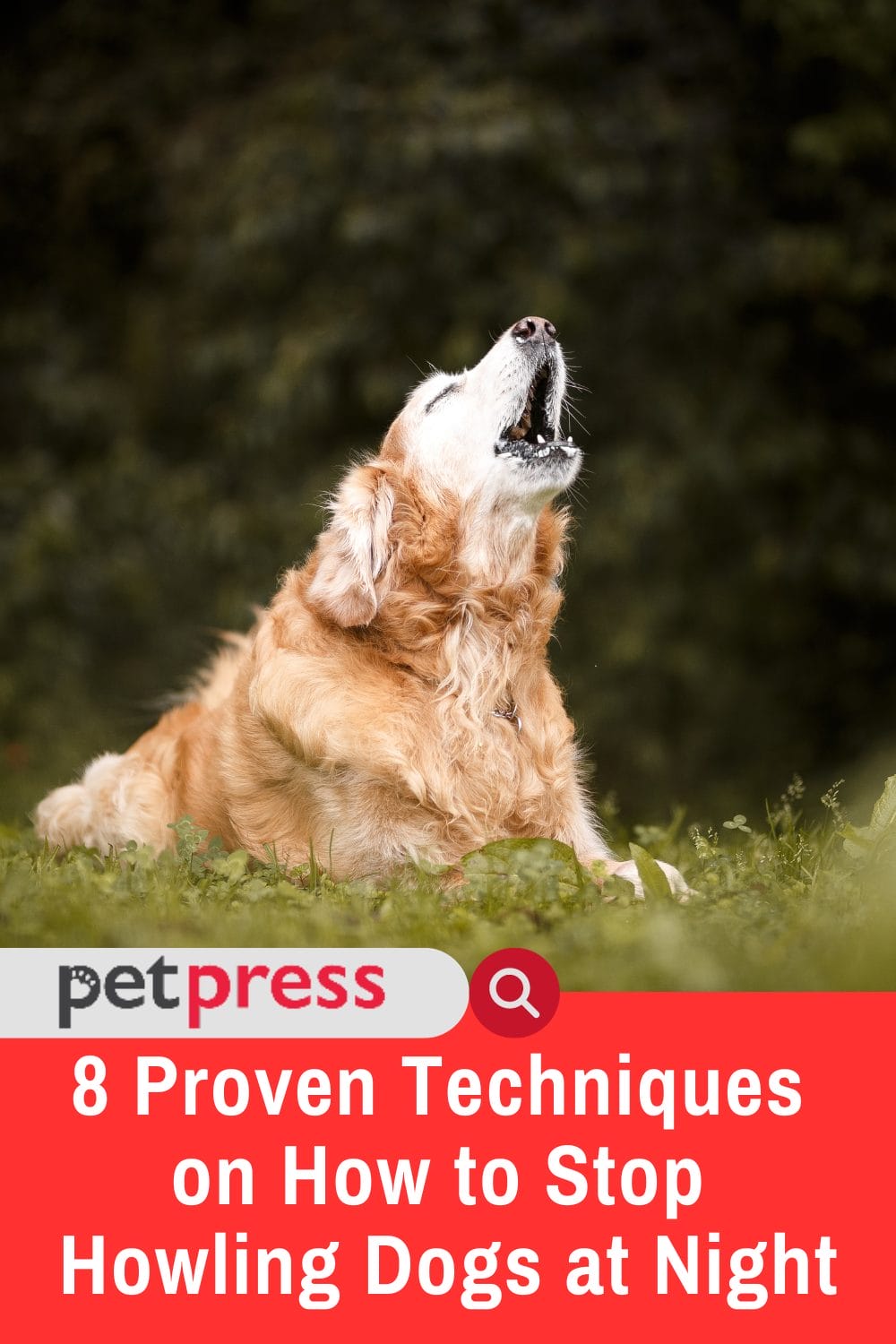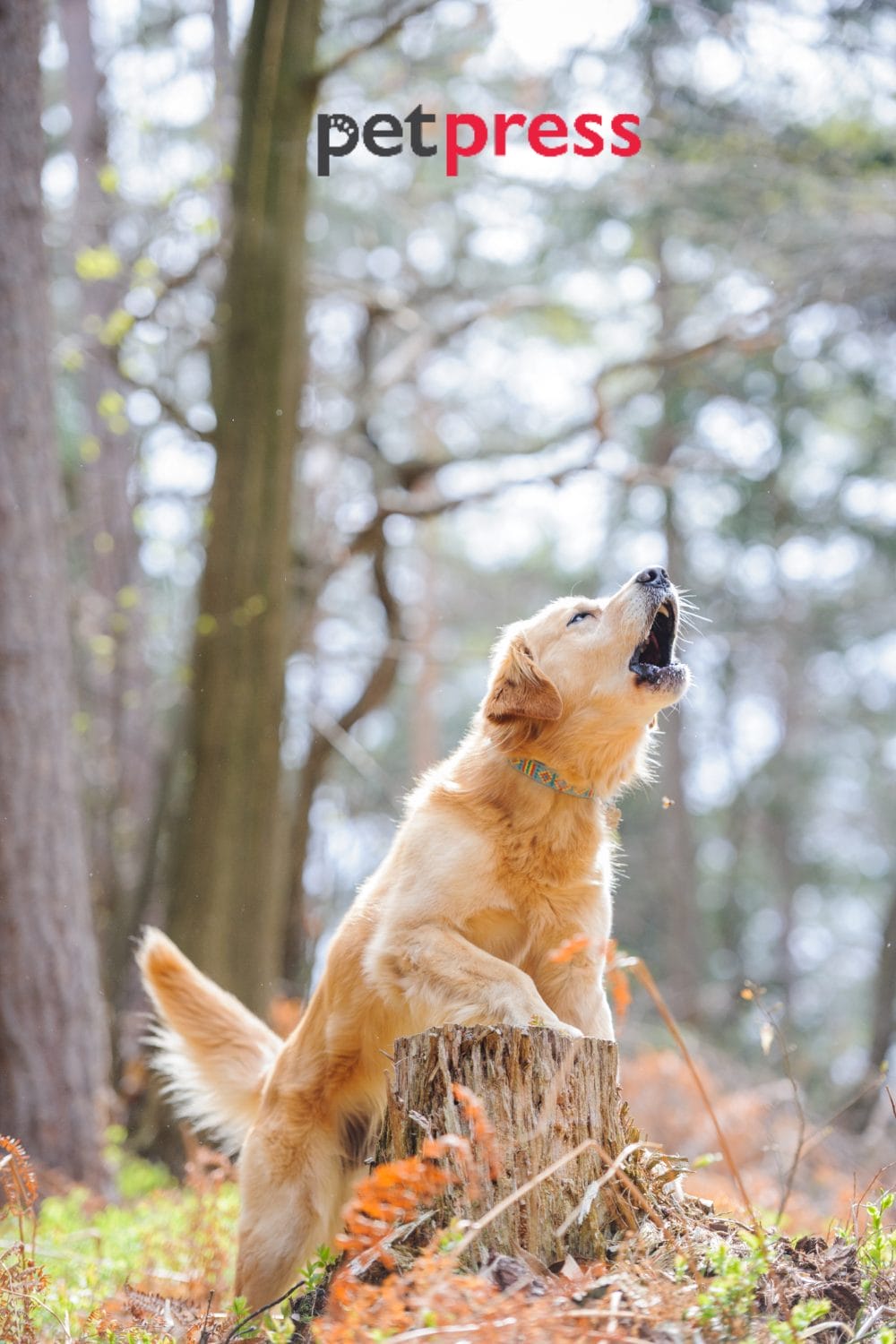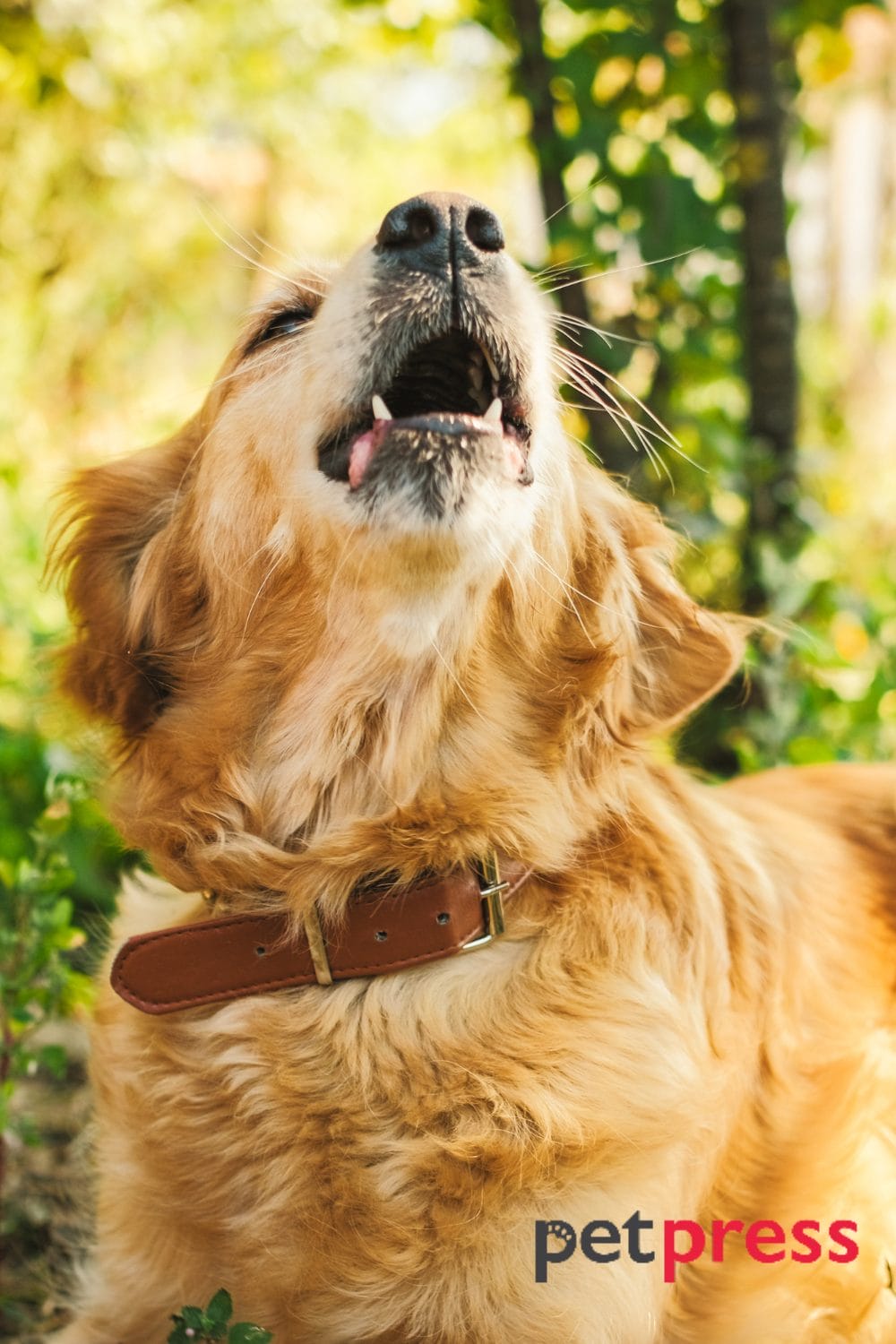
It’s midnight. Your eyes are closing, the world is silent, and sleep looks promising. Suddenly, a howl shatters the tranquility. You will sigh and think—if you only knew how to stop howling dogs at night.
If this sounds familiar, you’re not alone. Dog owners across the globe are dealing with howling dogs at night. But rest assured, there’s a solution.
In this blog post, we’re providing practical advice on how to stop howling dogs at night.

Understanding Why Dogs Howl: A Deeper Dive into the Canine Psyche
Understanding the reasons behind your dog’s behavior is fascinating and lets you interact more effectively with your pet. Let’s delve deeper into the causes listed above.
Communication: More Than Just Noise
Our dogs can’t talk, at least not in human language. Instead, they use a variety of sounds to express their needs and feelings—howling being one of them.
Hunger or thirst: Dogs can’t just mosey up to the fridge when they’re peckish. If your dog is howling, it might be time to refill their food or water bowl.
Need for Attention: Canines love attention and are not shy about asking for it. Maybe they want to play or simply want some loving petting. A howl could be their way of saying, “Hey, look at me!”
Alerting you: Dogs have keen senses. They could howl to alert you of a potential threat—a stranger approaching the house, for example.
Separation Anxiety: Lonely Hearts Club
Dogs are pack animals, wired for companionship. When left alone, they can experience separation anxiety, especially if it’s for an extended period. Nighttime can be particularly problematic, as this is traditionally a time for the pack to rest together.
In this case, howling is a cry for company, a vocal expression of their anxiety and discomfort. The dog may be trying to call their ‘pack’ (that’s you and your family) back home.
Medical Issues: Painful Midnight Melodies
A sudden shift in a dog’s behavior can indicate an underlying health issue. A dog that begins to howl at night might be in physical discomfort or experiencing health complications, especially if this is out of character.
Common issues could include injuries, illnesses, or age-related problems such as arthritis or dementia. These can cause your dog enough discomfort to interrupt their sleep, leading them to vocalize their distress through howling.
If your dog’s howling is accompanied by other signs of illness—lethargy, appetite loss, changes in behavior—it’s time to visit the vet for an examination.
By understanding why dogs howl, we pave the way for stronger relationships with our pets, filled with empathy and mutual respect. After all, communication is a two-way street—even if one party is howling!

8 Proven Techniques on How to Stop Howling Dogs at Night
Let’s dissect these techniques on how to stop howling dogs at night to understand how each can contribute to quieting your canine’s nocturnal serenades.
Provide Comfortable Sleeping Conditions
Just as a bed that’s too hard can disrupt your sleep, an uncomfortable sleeping space can disturb your pet’s rest and prompt howling. Ensure your dog’s bed is soft yet supportive, appropriate for their size, and located in a quiet, draft-free area of your home.
Ensuring your dog has a comfortable and quiet place to sleep is vital to curb their night-time howling.
Cozy Bedding: Invest in a comfortable, size-appropriate bed for your pooch. Some dogs prefer beds with raised edges for a snuggly fit, while others enjoy a flat surface.
Favorable Conditions: Drafts, noise, and light can disrupt your dog’s sleep. Ensure their sleeping spot is quiet, dark, and protected from drafts.
Right Temperature: Dogs can be as sensitive to temperature changes as humans. Ensure the temperature in their sleeping area is not too hot or cold.
Create a Stable Routine
Consistency provides a sense of security for your dog. Regular feeding, play, and bathroom times can reduce night-time anxiety, which often manifests as howling. Remember, a tired dog is a quiet dog!
Feeding Schedule: Maintain strict timing for meals. A well-fed dog is less likely to howl out of hunger.
Bathroom Breaks: Regular bathroom breaks, especially before bedtime, can prevent nighttime howling due to discomfort or urgency.
Exercise and Play: Regular exercise and playtime can tire out your dog, promising a restful night for both of you.

Use Interactive Toys
Interactive toys stimulate your dog’s mind and body, keeping them occupied and reducing the likelihood of attention-seeking or bored howling. These could be puzzle toys, treat-dispensing toys, or mentally challenging games.
1. Puzzle Toys. Toys like the Outward Hound Hide-A-Squirrel Puzzle can keep your dog engaged as they work to remove the small, squeaky squirrels from the larger, plush tree trunk.
2. Treat-Dispensing Toys. Toys like the KONG Classic Dog Toy can be filled with your dog’s favorite treats or kibble. They’ll have a blast trying to get the treats out, stimulating their minds and taste buds.
3. Interactive Ball Launchers. An automatic ball launcher like the iFetch Interactive Ball Launcher can keep dogs entertained for a long time, especially if they love fetch. With varying launch distances, it also makes for an excellent exercise tool.
4. Tug Toys. Interactive tug toys like the Tug-A-Jug by Busy Buddy provide a game of tug and dispense treats as your pet plays.
5. Interactive Plush Toys. Plush toys like the ZippyPaws Burrow Interactive Dog Toys involve squeaky mini toys that can be hidden inside the larger toy, presenting a challenge for dogs to retrieve them.
Apply the “Ignore” Technique
Ignoring the howling, especially when it’s clearly for attention, teaches your dog that this behavior will not draw your attention. Over time, they should stop howling as they learn it doesn’t achieve the desired outcome.
Use a White Noise Machine
Like humans, white noise can work wonders for dogs, too. The consistent, ambient sound can mask disruptive outside noises that might be causing your dog to howl.
Consider Crate Training
A crate can mimic a natural den, providing a secure, comfortable space for dogs. If your dog’s howling stems from separation anxiety, proper crate training can help. The crate should never be used for punishment but as a haven for your dog.
Get Professional Training
If your dog continues to howl despite your efforts, seeking professional help from a certified dog trainer or behaviorist could be beneficial. They can provide personalized techniques based on your dog’s specific needs.
Consult a Vet
Persistent howling can be a sign of underlying health issues. If you’ve tried everything and your dog still howls consistently, consult your vet to rule out any health problems.
Patience, consistency, and empathy are key when implementing these techniques. Understanding your pet’s howling is the first step to ensuring peaceful nights for you both.

Wrapping Up
Dog howling at night can be a frustrating problem, but remember, there’s always a solution. By understanding the cause and implementing the strategies in this guide, you and your dog can enjoy peaceful nights again.
Remember, every dog is different; what works for one might not work for another. Practice patience and empathy. After all, they’re not just our pets; they’re part of our family.
Like what you’ve read? Share this blog post with fellow dog lovers! Let’s promote better understanding and care for our furry friends.
FAQs about howling dogs at night
Your dog could be howling at night due to various reasons like hunger, the need for attention, discomfort, separation anxiety, response to noises, or underlying health issues.
Creating a comfortable sleeping environment, maintaining a regular routine, using interactive toys, ignoring attention-seeking howling, using a white noise machine, crate training, or consulting with a professional trainer or vet can help.
Yes, sudden and persistent howling, especially if it’s out of character for your dog, may indicate an underlying health issue. It’s recommended to consult a vet in such cases.
If your dog is howling for attention, ignoring them can teach that howling won’t get your attention. However, it’s essential first to ensure the howling isn’t due to hunger, discomfort, or illness.
If the howling persists despite trying various strategies, seeking help from a professional trainer or behaviorist can be beneficial. They can provide personalized solutions based on your dog’s specific needs.

Enjoyed this article? We’ve got equally good articles!
How Do Senior Dogs Act? A Guide to Their Complex Behavior
How Long Do Senior Dogs Sleep? Unveiling the Mystery with Love
Senior Dog Restless at Night: Tips to Ensure a Peaceful Sleep
- Does Cat Litter Melt Ice? The Complete Guide to Winter Safety - January 30, 2026
- Happy Tail Dogs: Understanding This Common Canine Condition - January 29, 2026
- How Cold Can Outdoor Cats Handle? Feline Winter Safety - January 27, 2026


GIPHY App Key not set. Please check settings